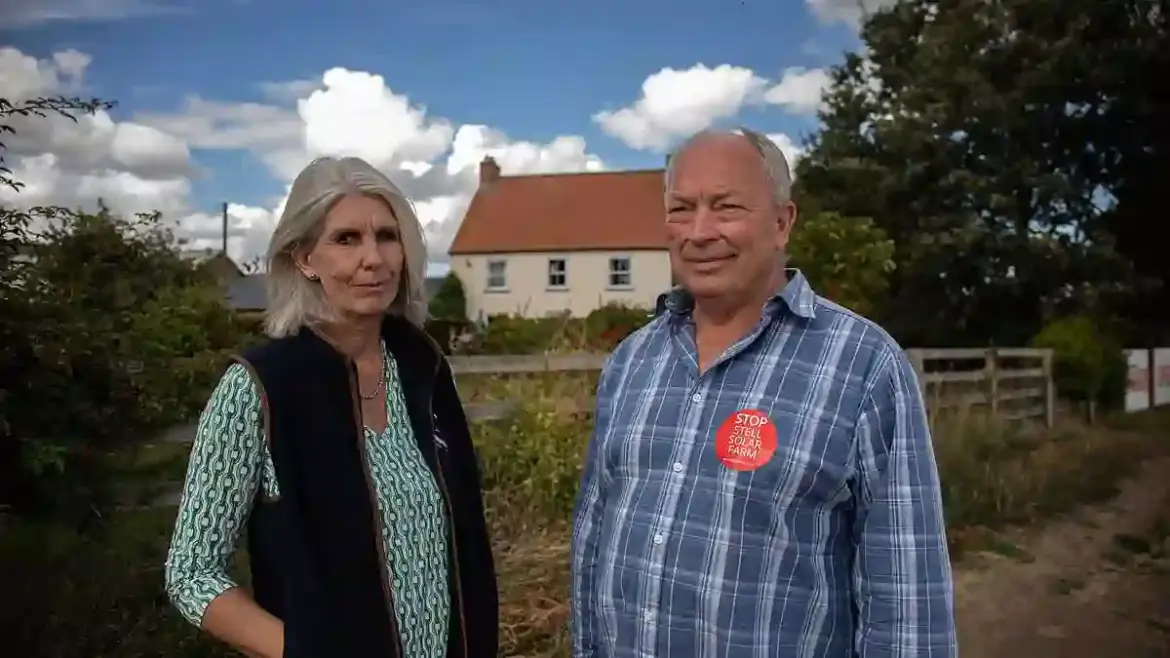What happens when the push for renewable energy collides with rural life?
In North Yorkshire, a heated dispute has broken out between a former Eton classmate of Prince William and a couple who say their way of life is under threat from a proposed solar farm.
Sir Henry Ropner, 43, once rumored to have dated Kate Middleton during her brief split from William, has leased more than 100 acres of land for a large-scale solar development.
But for Nigel and Crystal Foster, who live in a farmhouse right next to the proposed site, the project feels like an invasion of their peace and privacy.
From Family Farmhouse to Fight for Survival
The Fosters have called their four-bedroom farmhouse, Lord’s Moor Farm, home since 1997, when they bought the 18th-century property for £200,000 from Sir Henry’s late father.
Now semi-retired surveyors, they describe the area as “peaceful, tranquil, and pastoral.”
But if the plan goes ahead, they say their £1 million home will be surrounded by thousands of solar panels, changing their view forever.
“They would have us like a fox in a coop of chickens,” Mr. Foster said, adding that developers care only about profit, not the people affected.
The couple even offered to sell their property to the renewable energy company behind the project, Enviromena Developments, but say that request was rejected.
The Solar Farm Proposal
According to planning documents, the 113-acre site could generate enough electricity to power nearly 14,000 homes and save more than 7,000 tonnes of carbon emissions each year.
Developers argue that the land has struggled to yield profits when used for farming and that the project would deliver environmental benefits, including biodiversity gains.
The solar panels, measuring over seven meters long and nearly three meters high, would be arranged across the fields.
Plans originally placed panels completely around the Fosters’ home, but after pushback, developers introduced small “view gaps.”
For the couple, though, the compromise doesn’t go far enough.
A Clash of Values
For Mr. Foster, the battle is not just about land but about two different worlds colliding.
“The landowner comes from a background of metropolitan private equity type commercial values, as compared to us out here in the sticks, where we have traditional family country values,” he explained. “Our positions are irreconcilable.”
The couple insists they are not against renewable energy, but argue that solar panels belong on rooftops, above car parks, or on brownfield sites—not across green farmland that supports wildlife.
Environmental Concerns
A 2024 bird survey found 164 breeding pairs from 38 species on the site, including red-listed skylarks, grey partridges, and lapwings.
Conservation groups have raised concerns, pointing out that lapwing populations have declined sharply since the 1960s and are now listed as “near threatened.”
Developers counter that solar farms can actually benefit nature.
They highlight research suggesting solar sites in East Anglia supported more bird species than nearby farmland.
They also promise to retain trees and hedgerows and plant more native species to strengthen habitats.
Community Pushback
The Fosters are not alone in their resistance. More than 850 people have signed a petition opposing the plan, and a GoFundMe campaign to fund legal advice has already raised over £3,000.
Many locals worry that the project would industrialize the rural landscape, bringing substations, fencing, CCTV cameras, and “danger of death” signs into what was once open countryside.
Developers Defend the Project
Enviromena says it is committed to respecting communities while pushing forward with renewable energy to meet net zero targets.
The company acknowledges the Fosters’ concerns but maintains that a property buyout isn’t possible.
Instead, it has offered refinements to the design, though these changes have not satisfied the couple.
A spokesperson emphasized that the solar farm would use only part of the land, leaving room for ecology improvements.
Still, planning authority North Yorkshire Council has yet to make a decision on the application, leaving the Fosters—and their neighbors—waiting.
